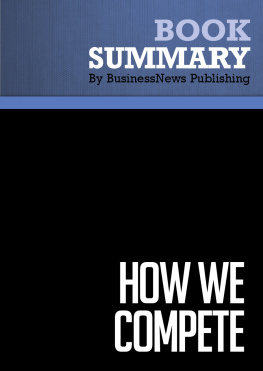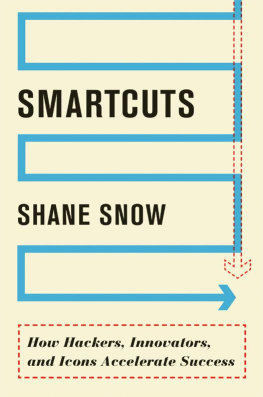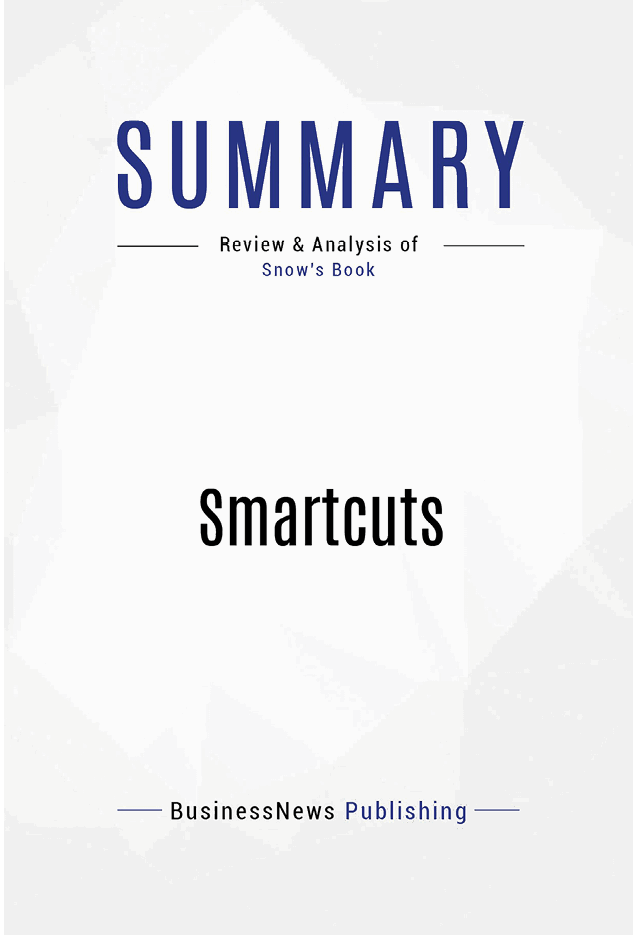Book Presentation: Smartcuts by Shane Snow
Book Abstract
In the 1860s, oil tycoon John D. Rockefeller took 46 years to make a billion dollars. In the 1980s, Michael Dell achieved billionaire status in 14 years. Bill Gates took 12 years. Jerry Yang and David Filo of Yahoo achieved the same milestone in four years, while eBay founder Pierre Omidyar took three years. In the late 2000s, Groupon's Andrew Mason did it in two years and was then fired from the company he founded.
Admittedly there's been inflation along the way but the undeniable fact is people are achieving much more in less time today than ever before. They're doing this not by taking shortcuts which land them in hot water but by taking smartcuts they break conventions and find smarter ways to get more done than anyone else. Smartcutters hack their way to success.
Smartcutters by-and-large employ nine principles which can be grouped into three classes:
- SHORTEN : Eliminate what is not necessary
- LEVERAGE : Find ways to do more with less
- SOAR : Generate momentum and go for it
The key to achieving more is not to pay your dues or even to play by everyone else's rules. Instead, you should hack your way to success. Figure out what smartcuts you can take by thinking laterally and then go out and break the rules.
Increasingly in today's culture, hacking is something done not just by criminals and computer scientists, but by anyone who has the capability to approach a problem laterally. (This is the original usage of the term.) You can make incremental progress by playing by the rules. To create breakthrough change, you have to break the rules.
- Shane Snow
About the Author
SHANE SNOW is a journalist and self-confessed geek. He is cofounder and chief creative officer of Contently Inc., a web-based platform which empowers freelance journalists to do what they love. He is also an adviser to Visual.ly and a published contributor to Mashable, WIRED Magazine, Fast Company, The New Yorker, Time, The Washington Post and New Scientist. He was previously the founder of Brave Media LLC and assistant editor at Scroll Newspaper . Shane Snow is a graduate of Columbia University's Graduate School of Journalism and Brigham Young University - Idaho.
Important Note About This Ebook
This is a summary and not a critique or a review of the book. It does not offer judgment or opinion on the content of the book. This summary may not be organized chapter-wise but is an overview of the main ideas, viewpoints and arguments from the book as a whole. This means that the organization of this summary is not a representation of the book.
Summary of Smartcuts (Shane Snow)
SHORTEN Eliminate what is not necessary
Smartcutters work incredibly hard. They use hacker style thinking to figure out a shorter path to success than others have ever noticed before. They eliminate the unnecessary cycles so they can get there faster.
1. Hack the ladder
In today's world, hackers are considered to be a problem but it's their mindset you can and should emulate. Hackers don't want to climb the traditional ladders of success they figure out ways to get to the top of their fields quickly. It turns out smartcutters do much the same thing.
For example, consider the fact the President of the United States is typically younger than most senators. The average age of the President of the United States is 55 years old. By contrast, most US senators don't even get elected to their first term until age 62. (Members of the House of Representative's average age is 57.) How does the President get to the top of the political heap before most senators even get in the door?
The simple fact is the president doesn't generally come through the normal ladder of succession in the field of politics. He (or maybe she in the future) typically comes up a different ladder and then pivots to national politics. This allows him to leapfrog all those who are paying their dues by working their way up the political ladder. Or put another way, presidents hack the ladder whereas average politicians get busy paying their dues.

The same phenomena arises in business as well. Fast-rising companies, rock-star CEOs and even the overnight best sellers frequently outshine and then outrun their peers by acting more like ladder hackers. They don't try and follow conventional patterns but blaze their own trails and leap from one industry to another with flair and finesse.
So how does this come about? To understand how hacking the ladder works, consider what happens in games. A well-known game amongst college students is called Bigger or Better. The basic idea is you start with something like a toothpick and then try and trade your way up. You might swap the toothpick for a pen, then swap the pen for a pack of Post-It notes, the Post-It notes for a magazine and so on. After a dozen or so trades, you might be able to turn a toothpick into a stereo system or something better.
Bigger or Better illustrates an interesting fact: people are generally willing to take a chance on something if it only feels like a small stretch. Researchers call this the psychology of small wins. Gamblers, on the other hand, would call it a parlay, which the dictionary defines as a cumulative series of bets in which winnings accruing from each transaction are used as a stake for a further bet.
- Shane Snow
The key to winning Bigger or Better is agility. If you don't like the trade in front of you, you don't waste time trying to sell the other person on making the deal. You switch to another person and see what they offer. It is this capacity to change directions quickly without losing momentum which is also a distinguishing characteristic of US presidential candidates. They can think on their feet and therefore are able to hack the ladder to the Oval Office rather than paying their dues and going step-by-step like others in politics.
New York City has always had a reputation as a place where people could prove they could make it against the best. Frank Sinatra even immortalized this idea when he sang: If I can make it there, I'll make it anywhere. New York has long been a global yardstick for artists, businesspeople and dreamers. Fast-climbing politicians use the Sinatra Principle to convey their credibility and to establish their competence. People judge a presidential candidate not by how much time they have spent in politics but by their leadership chops. That's why commanding an army (Washington or Eisenhower), running a university (Wilson) or governing a state (Reagan) were more important than time spent paying their dues in formal politics. Voters decided if they could make it there, they could make it anywhere. In a business setting, this same hack the ladder mindset works equally well. You see this by the fact history's fastest-selling and most transformative cellular phone (the iPhone) was introduced by a personal computer maker, despite the fact the phone market was dominated by huge telecommunications firms. Similarly, Nintendo started out making playing cards and brokering taxis before it seized opportunity in the American arcade game scene.







